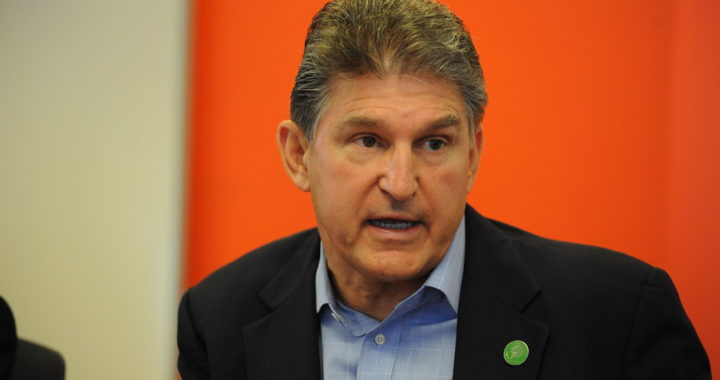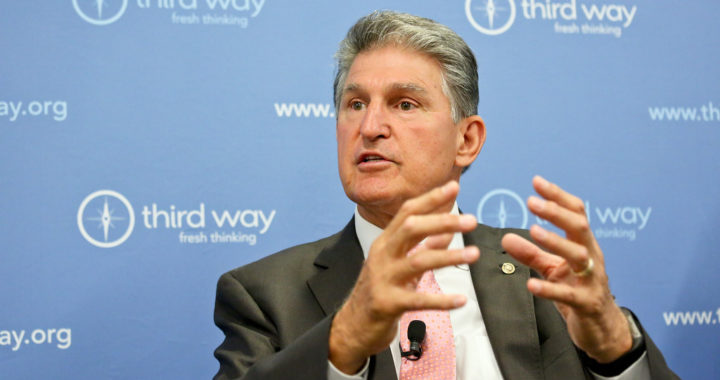‘Why the US Senate Is So Broken’: Manchin Vow to Preserve Filibuster Imperils Voting Rights and Much More
“Manchin represents a state that is 1/22 the population of California and 92% white, yet he can singlehandedly block policies supported by 70-80% of Americans.”
By Jake Johnson
Democratic Sen. Joe Manchin of West Virginia late Wednesday reiterated his opposition to abolishing—or even weakening—the 60-vote legislative filibuster, a stance that could imperil his party’s hopes of passing popular legislation to protect voting rights, reform the inhumane U.S. immigration system, raise the federal minimum wage, and more.
In an op-ed for the Washington Post, Manchin described the archaic Senate rule as a “critical tool” to uphold “our democratic form of government” and declared that “there is no circumstance in which I will vote to eliminate or weaken the filibuster.”
“‘There is bipartisan support for voting reform,’ Manchin writes, as Republicans introduce 361 bills to restrict voting rights in 47 states.”
—Ari Berman, Mother JonesManchin’s characterization of the 60-vote threshold runs directly counter to the argument from progressives—and a growing number of conservative Democrats—that the rule threatens democracy by giving the minority party inordinate power to tank bills supported by a majority of members of Congress and broad swaths of the U.S. public.
In a narrowly divided Senate, the existence of the filibuster in its current form also gives lone senators like Manchin and Sen. Kyrsten Sinema (D-Ariz.)—another strident defender of the filibuster—significant leverage to influence legislation.
“Joe Manchin represents a state that is 1/22 the population of California and 92% white yet he can singlehandedly block policies supported by 70-80% of Americans,” noted Ari Berman of Mother Jones. “This is why the U.S. Senate is so broken.”
Manchin claimed in his op-ed that there is “bipartisan support” for many of the Democratic Party’s top priorities—including infrastructure investments and some of the voting rights reforms proposed in the For the People Act—and expressed skepticism about using the filibuster-proof reconciliation process to pass major spending bills without needing Republican support.
But Manchin did not specifically explain how Senate Democrats can convince at least 10 Republicans to support key legislation when they have vocally opposed even the most basic elements of President Joe Biden’s recently unveiled infrastructure package and dismissed the For the People Act as a “partisan power grab.”
“Manchin is setting himself up to be Mr. Gridlock,” said Adam Jentleson, a former Senate staffer and an outspoken advocate of filibuster reform. “He’s putting himself on the hook to deliver 10 GOP votes on everything. When he fails, as he will, he’ll be the one blocking broadly popular policies that improve people’s lives and which Dems must pass to hold the majority in 2022.”
Manchin’s op-ed came as House Democrats continue to voice frustration with the Senate filibuster, which has consigned many popular House-passed bills to an increasingly crowded legislative graveyard.
After the Senate parliamentarian ruled Monday that Democrats can pass additional spending bills this year through the filibuster-proof budget reconciliation process, Rep. Ro Khanna (D-Calif.) tweeted that “this is a temporary fix to a systemic issue.”
“Enough with the procedural hurdles—just abolish the filibuster,” Khanna added, embracing a position backed by a growing number of Senate Democrats in recent weeks. Scrapping the filibuster would require the support of the entire Senate Democratic caucus plus a tie-breaking vote from Vice President Kamala Harris.
Rep. Jim Clyburn (D-S.C.), the third-highest ranking House Democrat, lashed out at Manchin over his position on the filibuster and the For the People Act in an interview with HuffPost last week.
“I’m insulted when he tells me that it’s more important to maintain a relationship with the minority in the U.S. Senate than it is for you to maintain a relationship with the minority of voters in America,” Clyburn said. “That’s insulting to me.”
“Since when do [the minority party’s] rights take precedence over your fellow Democrat [Sen. Raphael] Warnock, who saw his state just pass laws to keep him from getting reelected?” Clyburn continued. “And you’re going to say it’s more important for you to protect 50 Republicans in the Senate than for you to protect your fellow Democrat’s seat in Georgia. That’s a bunch of crap.”
While Manchin has refused to waver in his opposition to eliminating the filibuster, he recently voiced support for reviving the talking filibuster. Such a change would represent a dramatic break from the current no-show filibuster, which allows senators to obstruct legislation by sending an email.
The West Virginia Democrat did not mention that potential reform in his new op-ed.
Ezra Levin, co-executive director of progressive advocacy group Indivisible, expressed hope Wednesday that despite his latest comments, Manchin can still be moved on the filibuster issue with sufficient organizing and pressure.
“Manchin is right that democracy reforms have broad bipartisan support. Just not in the Senate,” Levin said. “Ultimately there’s not much new in his op-ed—it’s all talk until the vote is called. Like all politicians, he’ll stick his finger in the wind, and it’s up to us to change the weather.”
This work is licensed under a Creative Commons Attribution-Share Alike 3.0 License.



